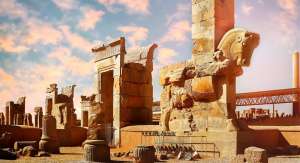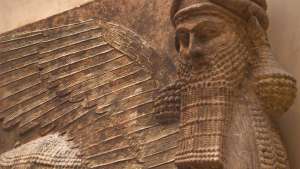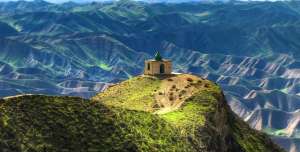Iraq should be one of the planet's most alluring travel destinations. It boasts fascinating ancient sites of Mesopotamia, Sumer and Assyria, including Babylon and the great Ziggurat of Ur; the 'Venice of the East', Basra; diverse ethnic groups including Kurds and Marsh Arabs; and of course the city that forms the focus of tales from the 1,001 Nights: Baghdad.

Tragically, the aftermath of Saddam Hussein's long reign and the subsequent war means that most of Iraq is not a safe destination. Fortunately, the region of Kurdistan is considered safe, even by the British Foreign Office, and so travellers are beginning to visit.
At some point, it may be safe for travellers to visit the rest of Iraq, to admire its ancient ruins, join Shia pilgrims on their spiritual journey to Kerbala, or wander through the bazaars of Baghdad and Basra. For now, Iraq remains largely off the travel map.
Recommends
Kurdistan
Iraqi Kurdistan is safe, friendly and open for business.
1. Erbil, known locally as Hewler, is believed to be one of the world's oldest continually inhabited cities. Not that you'd know that from its new shopping malls, skyscrapers and luxury car dealerships. For an insight into its past, browse the alleyways of the old bazaar, snacking on tasty street food such as bakla (stewed broad beans), and stroll up Erbil's citadel at dusk for people watching and to hear the call to prayer.
2. The small town of Halabja achieved wordwide notoriety in 1988 when Saddam Hussein's cousin, 'Chemical Ali', ordered a horrific poison gas attack on its inhabitants, killing over 5,000 people. Visit the memorial for a sobering record of the atrocity.
3. On a Friday do as the Kurds do, and celebrate the start of the weekend with a picnic in the countryside. You may even get invited to join a family in some traditional dancing.
4. While the majority of the region's Kurds are Muslim, other religious groups are present too. Visit the abandoned mountain monastery at Alquosh and learn about the mysterious Yezedi sect at their temple in Lalish.
5. Meet the locals over a cup of tea in a traditional chaikhana (tea-house). Kurds typically welcome an opportunity to talk to visitors and answer any questions about the country's recent history.
When the rest of Iraq becomes safe....
Sadly, museums and archives were ransacked during the 2003 invasion, and many historic monuments have been severely damaged. The extent of the destruction is yet to be determined, so these recommendations can only be broad suggestions.
1. Visit the Great Ziggurat of Ur, first built more than 4,000 years ago.
2. Discover the UNESCO World Heritage Site of Hatra, the best-preserved example of a Parthian city and one of the few stone monuments in Iraq.
3. Gape at the incredible Arch of Ctesiphon on the east bank of the Tigris south of Baghdad. This enormous monument is the largest single-span brick arch in the world, built in the 3rd century AD.
4. Watch locals haggle over brightly coloured birds at the Souk al-Ghazal before relaxing at one of the roadside cafés.
5. Explore the Shatt El-Arab marshes, marvelling at the locals’ man-made islands and woven reed huts.

When to go to Iraq
Much of Iraq is desert; summers are very hot and dry, with temperatures reaching 48°C. The mountains in the north and east, ie. in Iraqi Kurdistan, are cooler. The best months to visit Iraq are the cooler months of April, May, September, October and November.
International airports in Iraq
Erbil International Airport (EBL) is the access point for Kurdistan, with flights from a number of European and Middle Eastern destinations.It has one the longest runways in the world, and a large,modern terminal.
Baghdad International Airport (BGW) is about 16km west of the city centre.
Getting around in Iraq
Infrastructure in Kurdistan is slowly being developed; however, as a whole, transport in Iraq is dangerous and difficult to organise. A very few tour operators offer trips, especially in Kurdistan.
Iraq accommodation
Kurdistan has a range of hotels, particularly in Erbil and Suleimaniyah. The rest of Iraq, however, remains an unknown quantity.
Iraq food & drink
Most dishes are served with rice or breads. Local specialities are lamb dishes: shawarma, grilled meat in a sandwich wrap (a kind of kebab), or Bamia, lamb, okra and tomato stew. If there is a national dish, it is possibly magouf; fish (typically carp), marinated in a mix of seasonings and coooked over a fire.
Although the Kurds are big meat eaters, and don't understand vegetarianism, vegetarians (incl vegans) can eat well here, with plentiful fresh and tasty produce. Expect roasted/grilled vegetables, bean dishes (eg bakla), falafels, nuts, cheeses and yoghurt.
Tea is ubiquitous. Fruits juices are very good, and widely available. Alcohol is available in some hotels and restaurants.

50 USEFUL TIPS FOR TRAVELING TO IRAQI KURDISTAN
Iraqi Kurdistan is no desert and, most importantly, it is not a war zone filled with ISIS terrorists but an autonomous region which, for the last couple of years, has done a tremendous job defending its borders.
Kurdistan is one of the safest countries in the Middle East and the most ultimate destination for travelers looking for something unique, very off the beaten track, and who are willing to meet the Kurds, a very proud and brave nation, who turn out to also be some of the most hospitable people I have ever encountered, with similar experiences to Iran, Pakistan, and Sudan.
From visiting refugee camps to crazy stories involving the Peshmerga military, great hitchhiking and camping experiences and just amazing people with unbelievable stories to tell, Kurdistan may be the high point of all your backpacking travels.
After visiting Kurdistan twice, I have compiled a guide with 50 useful tips which, hopefully, will help you traveling to Iraqi Kurdistan.
COVID-19 travel restrictions for Iraqi Kurdistan
For entering Iraqi Kurdistan, the following requirements apply:
- Negative PCR test done no later than 72 hours before arrival in Iraqi Kurdistan
- Upon your arrival at the airport, you must undergo a second PCR test, which costs 50USD. Results will be notified on the next day and meanwhile, the authorities will keep your passport, but you will be able to roam around freely in Erbil and pick up your passport on the next day
- For leaving the country, you must also hold a negative PCR test, which you can do in the Zanko Health Center in Erbil

A few quick tips before traveling to Kurdistan
1 – What to do in Kurdistan
You may be wondering why the hell you should visit Kurdistan, but there is actually a lot of potential in this country.
From visiting historical sites to volunteering in refugee camps, hanging out with local people, war heritage stuff and even outdoor adventures, I think that Kurdistan is a pretty complete destination with plenty of stuff to do.
2 – When to visit Iraqi Kurdistan
Spring and fall are the ideal months to travel, when the temperatures are mild. Winters are surprisingly cold, even in Erbil, and summers are hot. However, the weather is never really extreme, so I would say that Kurdistan is a year-round destination.
3 – Iraqi Kurdistan is an autonomous region
Kurdistan has a lot of autonomy from the rest of Iraq, to the extent that they control the airport, immigration, their borders; they have their own army and, of course, they have their own Parliament.
This is one of the main reasons why Kurdistan is a safe destination and whatever unfortunate event you heard recently in the news about Iraq, doesn’t really affect Kurdistan.

Visa for traveling to Kurdistan
4 – Many Western nationalities can get a free visa on arrival
EU countries, the USA, Canada, Australia, Brazil, South Korea, Japan and New Zealand can get a free 30-day free visa on arrival, both at the airport and the land border. You just get a tiny, insignificant stamp and that’s it.
Update April 2021
Since very recently, visa no arrival now costs 70USD. Travel reports on this particular topic are very welcome.
5 – The other countries though, need to go through a very tedious process
For people of other nationalities, getting a visa can be a difficult and expensive process. I suggest you contact your nearest Iraqi Embassy or email the KRG Representation.
6 – Iraqi Kurdistan visas can’t be used to visit the Arab Iraq
This is important. A valid visa for traveling to Iraqi Kurdistan doesn’t allow you to visit outside of Kurdistan, that is to enter actual Iraq. If you try to enter, you will just bump into very strict military control who will send you back home.
Just to clarify, because many people ask me, this also includes Mosul. You can’t go to Mosul with a Kurdistan visa.

Travel Insurance for Iraqi Kurdistan
7 – Don’t get any regular travel insurance
Iraqi Kurdistan is no normal destination and, most likely, it is a country that your Government advises against all travel to, so most travel insurance companies will not offer coverage for Iraq.
8 – One of the very few which does is IATI Insurance
I recommend it for the following reasons:
- It provides coverage to a big bunch of adventurous destinations which other don’t, like Iraq, Syria or Sudan
- It has loads of different plans at very competitive prices
- Readers of Against the Compass can get an exclusive 5% discount
How to get to Iraqi Kurdistan
9 – How to travel to Iraqi Kurdistan by air
Kurdistan has two international airports: Erbil and Sulaymaniyah and, most likely, you will be flying to Erbil. Pegasus (via Istanbul) and Fly Dubai (via Dubai) are the cheapest and most common routes.
10 – How to travel to Iraqi Kurdistan by land
You can enter Kurdistan from either Iran or Turkey. The Iranian side is very easy and straightforward but the Turkish authorities will give you a lot of trouble.
- From Iran
- From Turkey

Books for traveling in Iraqi Kurdistan
11 – Iraq Travel Guide by Bradt
I always recommend their guides for all destinations, so Iraq will be no different. They have, obviously, the only travel guide to the country, with a pretty long chapter focused on Kurdistan. Bradt has the most insightful guidebooks I have ever read.

12 – The Rise of the Islamic State
This is my favorite journalism book ever and it is written by Patrick Cockburn, one of the world’s top experts on the Middle Eastern conflict. In this book, he gives an extremely perceptive introduction to the origins of ISIS, with many references to Iraqi Kurdistan and Iraq, of course. A really useful book to understand the complexity and origin of the conflict.

Is it safe to travel to Iraqi Kurdistan?
13 – The bad things that happen in Iraq don’t happen in Kurdistan
Whatever you have been hearing in the news about Iraq for the last few years, happened in Arab Iraq, not in Kurdistan.
The last terrorist attack that occurred in Kurdistan was in Erbil back in 2014. This means that London and Paris have suffered more attacks than the whole of Kurdistan itself.
14 – However, the region is very unstable
I never meant that traveling to Kurdistan will be as peaceful as your spiritual journey through Bhutan, not even close.
Despite being safe, the region is highly volatile and effective military operations are the only reason why it is safe. This means that things may change overnight, so being extra careful is more than wise.
15 – There are military controls everywhere
When you travel between towns and cities, you will find so many military checkpoints run by Kurdish Army guys named Peshmergas.
As a Western passport holder, they don’t give you any trouble but, once, I was traveling with an Iraqi from Baghdad and they held him for 15 minutes, at least. They don’t trust Arabs at all as any Arab could, potentially, be an ISIS spy.
16 – Crime rates are ridiculously low
Kurdistan has one of the lowest crime rates in the world. It is one of those places where you may forget your phone in a café, come back in a few hours and still recover it.
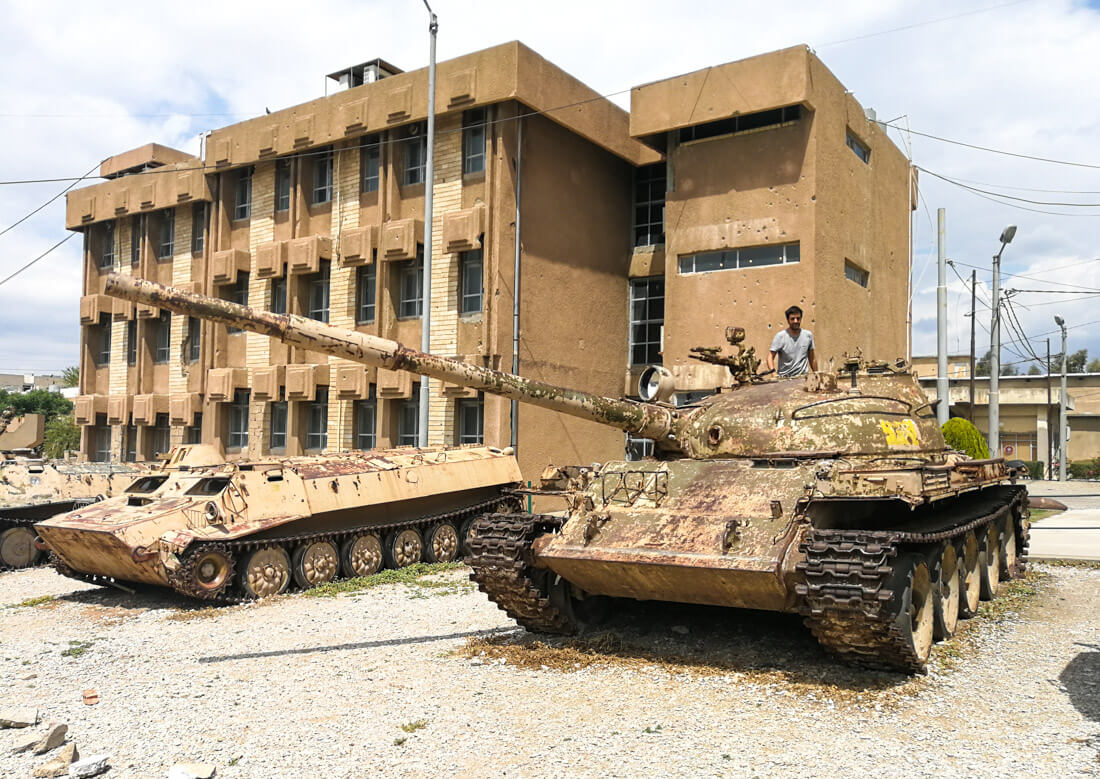
Solo female travel in Iraqi Kurdistan
Iraqi Kurdistan is a very safe region of Iraq, regardless of your gender.
Actually, I personally think that, for women, it is much safer than other mass tourism destinations such as Egypt.
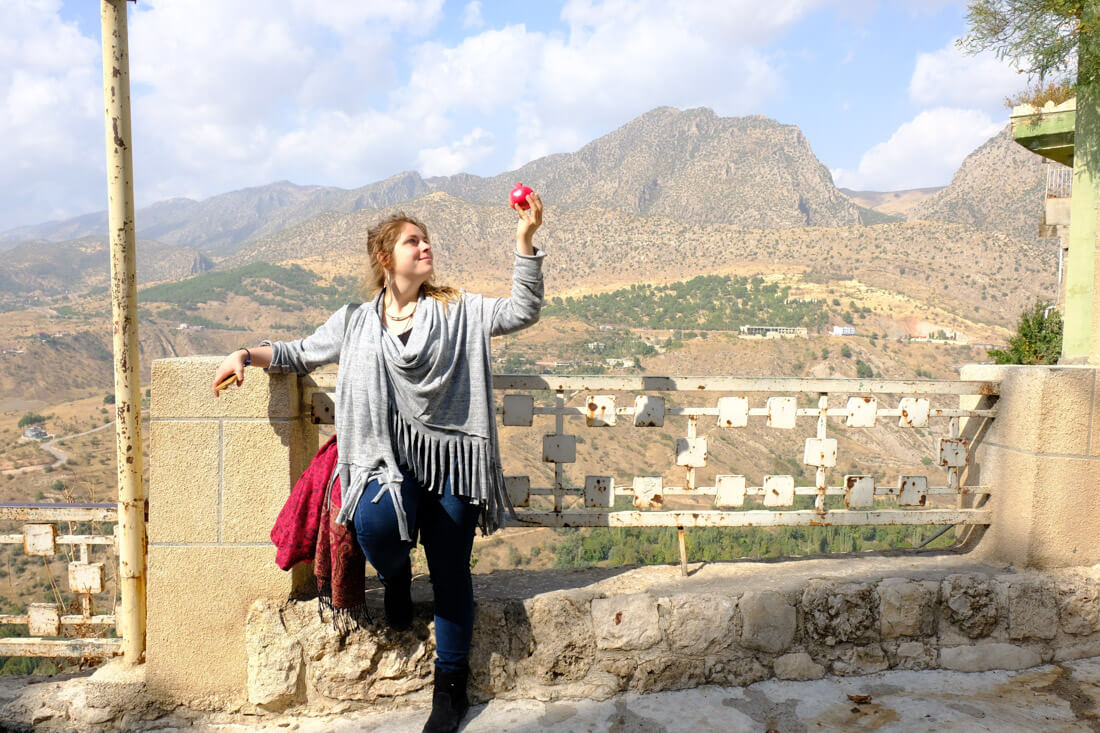
Money when travel in Kurdistan
17 – The official currency is the Iraqi Dinar
And, in September 2018, 1USD = 1,200ID.
18 – Money exchange
You can easily exchange €, USD and GBP in all the main cities.
19 – Some exchange offices are, somehow, peculiar
Some exchange offices are just stalls in the middle of the street, with no surveillance, no security and no glass screen with lots of huge bundles of cash. The reason is that the crime rates here are very low.
20 – Credit cards and ATMs
Most ATMs will accept foreign cards but most places, even in expensive restaurants where I ate, didn’t accept credit cards, so remember to always have cash with you.
21 – How much does to cost to travel in Iraqi Kurdistan
Compared to its neighbors, traveling in Kurdistan isn’t very cheap.
- Budget Hotels: 20,000-25,000ID (16-21USD)
- Beer: 1,200ID (1USD) at the supermarket and 10,000ID (8.40USD) in a bar
- Fast food: 1,000-1,200ID (around 1USD) for a shawarma
- Local eateries: 5,000 to 8,000ID (4 to 7USD) for a local meal, consisting of rice, beans and chicken
- Fancy restaurants: Main courses starting at 14,000ID (12USD)
- Taxi rides within cities: from 3,000ID to 5,000ID (from 4 to 7USD)
- Transportation between cities: Local shared taxi from Suleymaniyah to Erbil costs 15,000ID (12USD)
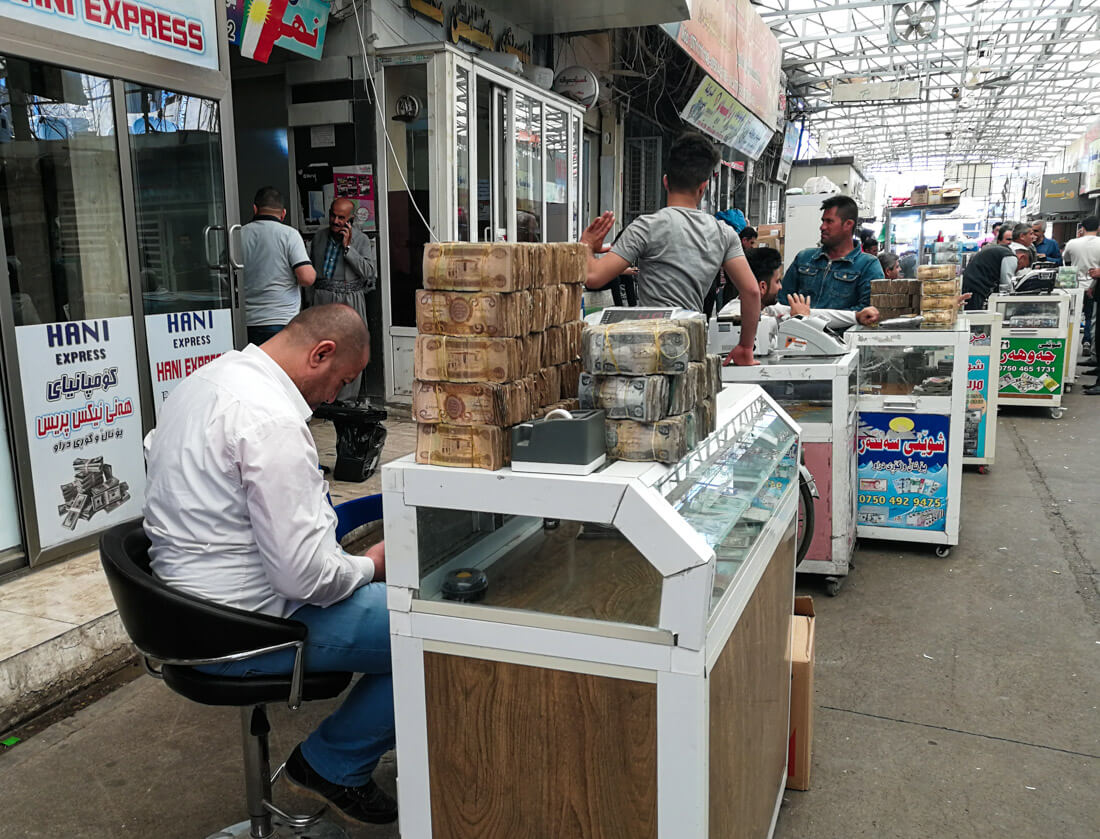
The Kurds and their country and culture – Kurdistan Travel Guide
22 – Kurds are spread over 4 countries
Kurds are spread over Syria, Turkey, Iran, and Iraq, the last one being the most autonomous region.
Many years ago, they used to be one single country but, at the end of the British Empire, the British themselves decided to draw the Middle Eastern map like that.
23 – Kurds are not Arabs
Kurds are a different nation and ethnicity who are closer to Persians than Arabs. Never tell a Kurd that they are Arabs, or like Arabs, because they won’t like it.
24 – Kurdish is the main language
Kurdish, a language with many similarities to Farsi and Turkish is the official language in Kurdistan.
25 – Young people don’t speak Arabic anymore
People who are less than 30-years old don’t speak Arabic. They don’t teach it in schools anymore and this was a very drastic measure from the Kurdish Government after the Saddam Hussein invasion, when their national pride and differences versus the Arabs accentuated even more.
26 – English
Young, well-educated people speak English but that’s it. With the rest of the population, you will have to talk using signs or Google Translate.
27 – Many Kurds don’t like Arabs, at all
Educated Kurds are aware that their problems with the Arabs are more political but, during my journey, I met many closed-minded Kurds, especially in the villages, who told me that they really hate Arabs.

28 – They are Sunni Muslims
Kurdistan is a Muslim country and most of them are Sunni.
29 – However, they are some of the least religious people in the Middle East
My good Kurdish friend Badarkhan once told me that, when Saddam Hussein invaded Kurdistan, he committed the most brutal atrocities in the name of God so, after this, many Kurds lost faith in Islam.
You will quickly realize that Kurdistan is not as religious as many other Middle Eastern countries and people are much more liberal.
30 – There is also a huge Christian community
Erbil has a big Christian district and there are several Christian villages throughout the region. There are also other religious minorities, such as Yazidis and Zoroastrians.
31 – Kurdish hospitality
Like when you are traveling in Iran, in Kurdistan you will also receive so many house, lunch and chai invitations. Being hospitable with their guests is in their blood and, on top of this, they absolutely love foreigners.
32 – Kurdistan is the most developed region in Iraq
And not only due to the fact that they have some of the largest oil reserves in the country, an important business hub like Erbil and control the main borders with Turkey and Iran but also, because Kurdistan hasn’t been so affected by the current war.
33 – Because of all the above, it is not surprising that they would like to separate
More than 90% of the Kurds want to separate from Iraq and, in fact, they had a referendum in October 2017 but, due to the international pressure and threats from Iraq and its neighbors, they couldn’t move it forward.

The food in Iraqi Kurdistan
34 – A shawarma economy
During your trip to Kurdistan, you will get absolutely sick of shawarmas. In 90% of the cases, they will be the only option. They are extremely cheap but they are also extremely nasty and unhealthy. I hated them but this is what their street food culture is about.
I used to tell one joke to my Kurdish friends: I think that your economy is based on oil and shawarmas. Being such an oil-dependent country having shawarmas absolutely everywhere made me come up with this.
It is obviously a joke which you may not find funny but I do.
By the way, many places serving shawarma also serve falafel, a healthier option.
35 – You may find kebabs
On a lucky day, you may find some places serving good kebabs, of all types. The good ones aren’t cheap though and you will realize that you may end up paying almost 10USD for just a few kebabs.
36 – And if you are extremely lucky, you may find a local eatery
Local eateries typically serve red beans with rice and chicken. However, I never found any of these in small towns and villages and very few in both Erbil and Sulaymaniyah.
37 – The best Kurdish food is served at home
When I visited Iraqi Kurdistan, I was very lucky when a friend invited me to his house and his mother had cooked lunch for a whole army. She made loads of different traditional dishes, so I could try a lot of new things.
Their cuisine is mostly rice and meat-based, always quite fatty and with many stews. Red beans will always accompany any meal and, when they have guests or on any special occasion, they don’t care about making you eat chicken, lamb, and beef at the same time, along with fried rice with meat in it and a lot of flatbread. I left his house completely rolling.

Drinking alcohol when you travel in Kurdistan
38 – Good news: Alcohol is widely available in Kurdistan
Unlike the rest of Iraq, liquor stores are available everywhere. You can buy fresh, cold beer, wine and any type of liquor. In Erbil and Sulaymaniyah you can find plenty of bars, as well.
39 – You can actually drink on the street
I didn’t really drink in the center of Erbil but I had some beers in a few parks in both Erbil and Suleymaniyah, as well as in villages throughout the country and I never had any problems.
Well, this is not actually true because, in Suleymaniyah, I had a beer in the main square, basically because my Couchsurfing host told me it was OK but the police came to me quite annoyed, but they just made me put it away. Apparently, it is legal to drink but some police don’t like it anyways.
40 – In supermarkets, beer is cheap, not in bars
In the stores, a beer costs not much more than a dollar but, in bars, they charge 10 times more, unfortunately, so if you are on a budget, don’t get drunk in bars.
41 – Chai and cafés
Like pretty much all countries in the Middle East, chai is a big deal and it always comes with sugar by default. Hanging out in cafés is one of the highlights of any trip to Kurdistan, as it is the best place to socialize with friendly locals.
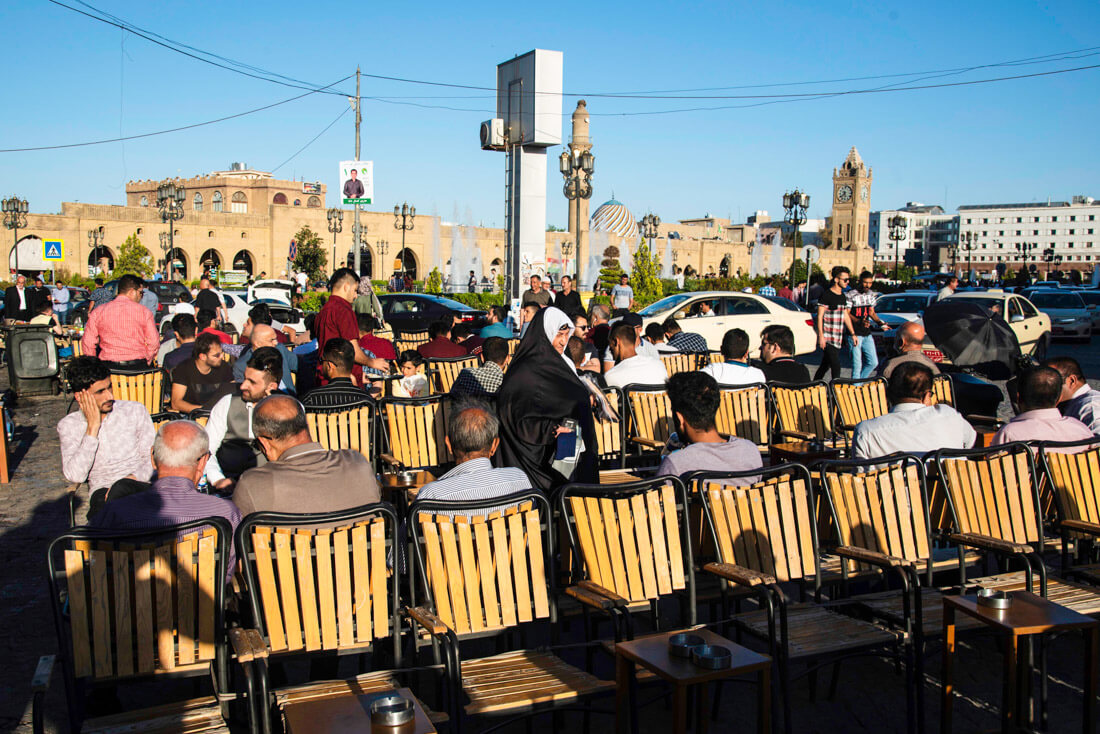
A tea house in Erbil – Iraqi Kurdistan travel blog
Transportation – Traveling around Kurdistan
42 – Moving around by buses
Buses are basically mini-vans but they don’t really run to many places, except between the main cities. They are much slower than shared taxis and not much cheaper.
43 – Local shared taxis
The way to go. They go everywhere and are the most common way of transportation among locals. They aren’t cheap as in Iran and Central Asia but still quite affordable.
44 – Hitchhiking in Kurdistan
Super safe and convenient. I hitchhiked all the way from Soran to Dohuk via Amedi, which is around 300km. Nobody never asked me for money and I had great experiences with many of the people, which a few times involved stopping for lunch or even making a detour so they could drop me just at the place I wanted.
However, I have to say that many people didn’t stop, so I had to wait for some time on a couple of occasions.

Internet and SIM Card
45 – Wi-Fi
It is not the fastest Wi-Fi in the world but it is pretty decent and you find it all across the country. Internet is not much of an issue when you travel in Iraqi Kurdistan.
46 – SIM Card and 3
You can buy a local SIM Card but buying data is rather expensive. The locals recommended me Ana Cell and I paid 5,000ID (4.20USD) for the SIM Card and 18,500ID (15USD) for 5GB of data.
Accommodation when you travel in Iraqi Kurdistan
47 – Couchsurfing
In Suleymaniyah and Erbil there are so many active profiles. You may also find a few in Dohuk but outside of the main cities, I never got a couch.
48 – Budget Hotels
Like I said before, the cheapest hotels will cost you around 12 or 15USD but they can’t be booked online. You can check all the hotels I stayed at in my Kurdistan itinerary.
49 – Mid-range / Top-end Hotels
In Erbil, Suleymaniyah and Dohuk you can find endless hotels and deals on Booking.
50 – Drones
I am telling you this based on my own experience. When I was traveling in Kurdistan, I got arrested for having a drone and I didn’t even fly it. They found it in my backpack and they took me to a military base, where they interrogated me for a few hours.
I really thought they I would not get my drone back but, in the end, they believed my story. Basically, they are used by ISIS to spy, so if you do have one because you are overlanding, hide it and don’t fly it!
51 – Tourists visiting refugee camps
It is possible to visit some Syrian refugee camps, but just some of them. They are outside the cities and you should go with a local.

